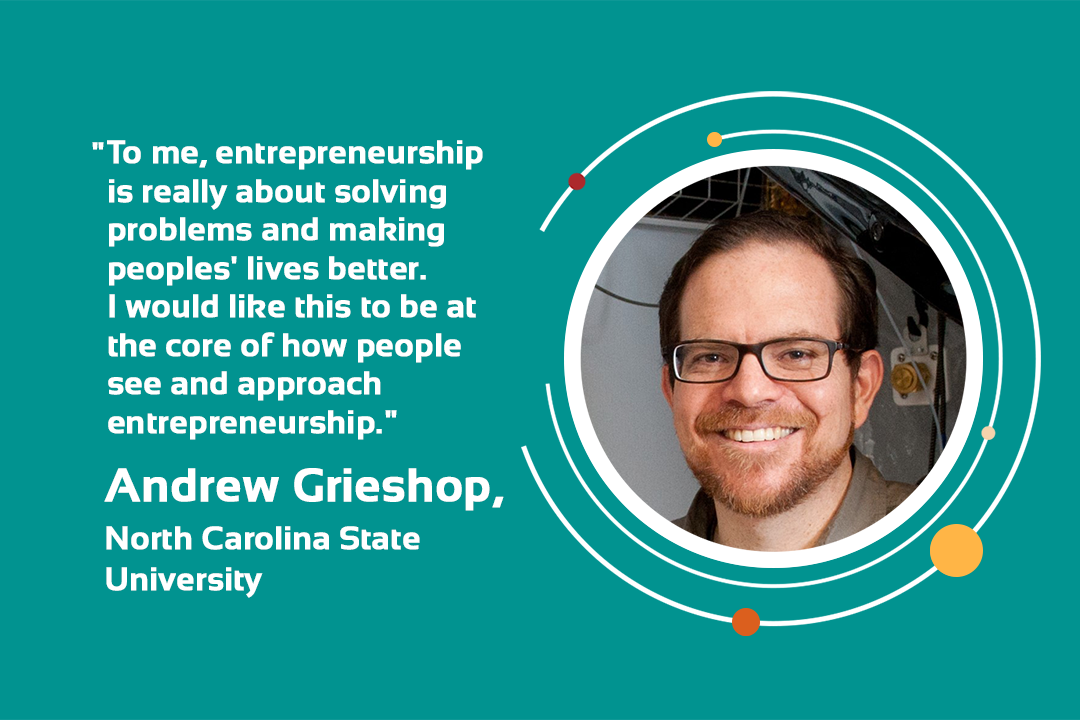
Our Faculty Spotlight series highlights educators within the VentureWell network who are doing transformative work—faculty members who are catalyzing change in higher education and inspiring students to impact the world through invention. This month’s spotlight is Dr. Andrew Grieshop, Associate Professor in the Department of Civil, Construction, and Environmental Engineering department at North Carolina State University. Dr. Grieshop works to help engineering students design new sustainable infrastructure solutions using smart technology. In the Spring of 2020, he received a Faculty Grant to produce a new experiential-learning course that guides students as they develop and launch sustainable infrastructure concepts in energy, water, and transportation.
how did you become interested in teaching entrepreneurship?
I am a mechanical engineer by training and have always been a maker and tinkerer. My first ‘real’ job out of my undergraduate degree was with a small distributed-energy company that was developing micro-turbines for power generation in the late 90’s, so I was exposed to entrepreneurship early. After a number of other professional and academic experiences, I’ve found myself happy working as a faculty member and found that the educational culture is quite different, as the focus is on really big, long-lived systems like infrastructure. In my research, I worked with sensors and data acquisition and interacted with small companies and innovators, but my colleagues and I felt like entrepreneurship could be better integrated into our curriculum.
what is your favorite thing about teaching?
Connecting with students, trying to inspire those ‘lightbulb’ moments, and seeing when they happen are all some of my favorite things about teaching.
where would you like to see the field of entrepreneurship in five years?
I would like to see the associations with the word ‘entrepreneurship’ change. I think most people, me included, tend to associate it with making new ‘widgets’ and getting rich. I have nothing against either of those, but they’re not the primary things that drive me. To me, entrepreneurship is really about solving problems and making peoples’ lives better. I would like this to be at the core of how people see and approach entrepreneurship.
what are the challenges you’re tackling in your work today?
A big part of it is figuring out how to respond to the new constraints imposed by the COVID-19 pandemic. Much of my research involves international field work, which is not feasible right now. I’m focusing on working with research students to make sure they can build their academic and professional toolkit and make contributions to research and scholarship, despite these very different, unexpected, and unpredictable circumstances.
how have you pivoted your courses or teaching style during the pandemic?
In the Fall I taught a measurement and data analysis course to a small group of graduate students in my department. Typically, this is a project-driven class with lots of small-group, hands-on work. Much of this wasn’t possible under current circumstances, so I shifted to all ‘open-source’ hardware (Arduino) and software (Python) and had the students do labs and projects at home. This worked pretty well, and my plan is to keep all of these changes.
what books on entrepreneurship and innovation have you been reading lately, and how have they been insightful to you?
I was gifted The 99% Invisible City: A Field Guide to the Hidden World of Everyday Design by Roman Mars and Kurt Kohlstedt. It’s not focused on entrepreneurship and innovation explicitly, but it does focus on urban design. It’s fascinating to read vignettes about how cities have responded to changing circumstances and incorporated new technologies as they’ve grown, and how much thinking and history there is behind all the aspects of cities that we often take for granted.
[Editor’s note: We highly recommend the 99% Invisible podcast as well!]
what’s your most useful classroom activity or assignment?
My graduate ‘measurements’ class has students develop a measurement and analysis project from scratch, with the time and equipment constraints imposed by the course. Honing an experimental objective that is sufficiently well-posed and realistic is much more challenging than students think, and I think iterating through this process is incredibly useful. My hope in the course and activities we’re developing with VentureWell support will be built around this project-based, iterative approach to designing sustainable infrastructure. There’s really no better way to learn about design, whether of research projects, experiments, or new products or services.
VentureWell Faculty Grants provide up to $30,000 to help fund and support faculty with innovative ideas to create new or transform existing courses and programs to help students develop novel, STEM-based inventions and gain the necessary entrepreneurial skills needed to bring these ideas to market.